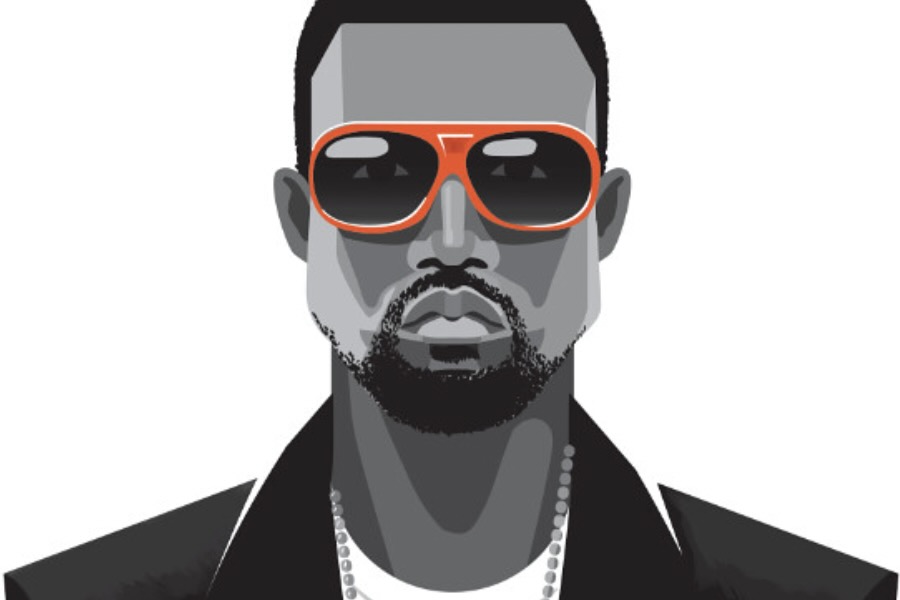Heartless: How Kanye West’s “Donda” collaboration ignores the stories of survivors
Credit: Courtesy of Flickr user Robert Ball
WSPN’s Emily Roberge discusses the implications of Kanye West’s controversial inclusion of Marilyn Manson and DaBaby in his recently-released, Donda album.
September 15, 2021
Listening to music transforms many music listeners to another world. Whether it’s a pump-up song before a big game, a relaxing song before an important test or just a shuffle of your favorite artists, music is everywhere. The recent release of Kanye West’s much-anticipated album, “Donda”, on Aug. 29 left many fans ecstatic. However, West shocked fans when he featured Marilyn Manson, a famous rocker facing many sexual assault allegations. West would also include DaBaby in his Aug. 26 release party, a rapper who faced controversy after making homophobic comments at the Rolling Loud music festival in Miami. Powerful people with large followings like Kanye West need to stop collaborating with artists who have sexually assaulted others just because these artists might boost the attention of their album. This collaboration prevents survivors from sharing their stories when celebrities ignore cases of sexual assault.
Feb. 1, 2021, actress Rachel Evan Wood came forward with allegations of sexual abuse against Manson, whose legal name is Brian Warner.
“He started grooming me when I was a teenager and abused me for years,” Wood said in an Instagram post. “I am done living in fear of retaliation, slander, or blackmail. I stand with the many victims who will no longer be silent.”
Aside from Wood, there are currently 15 women who have made allegations of psychological abuse and sexual assault against Manson.
A continuous pattern:
These recent sexual assault allegations against Manson were not the first; they are continuous. His predatory behavior dates back to 2001 when he was charged with felony-fourth degree assault and sexual misconduct against his security guard, Joshua Keasler. Manson would later reach a settlement with Keasler and be fined only $4,000 for his actions. Such “punishment” barely serves as one, let alone serves as a deterrent for predatory sexual behavior. Once an abuser assaults someone for the first time, there’s a high chance this behavior will continue.
In 2018 a police report was dropped against Manson for “unspecified sex crimes” from 2011, citing “absense of corrobation.” Even our legal system has allowed Manson to ruin more lives without any severe repercussions for his behavior.
Some of this problem stems from the statute of limitation, which limits the amount of time the perpetrator can be tried after the crime. However, Wood has been an advocate for other survivors, as she is involved in the Phoenix Act, which “strives to give victims more time to come back from their trauma and create more rights for survivors, not to create harsher punishments for the perpetrators.” Wood’s work may empower more survivors to come forward.
Alongside the allegations of sexual and psychological abuse, Manson is also being accused of racism. In an Insider article, Wood details Manson’s behavior, “I was called a ‘Jew’ in a derogatory manner. He would draw swastikas over my bedside table when he was mad at me,” Wood wrote. “I heard the ‘n’ word over and over. Everyone around him was expected to laugh and join in. If you did not or (God forbid) called him out, you were singled out and abused more.”
Whether it’s the racial remarks he has said or the trauma he has caused his survivors, it’s clear that he is a monster who should not be allowed to continue his career. As one of his survivors Ashley Walters said, “It became clear the abuse he caused; he continues to inflict on so many and I cannot stand by and let this happen to others. Brian Warner needs to be held accountable.”
When West included Manson in his album release party and as a collaboration in a song, it was a slap in the face to survivors. It gave the message to perpetrators that attention and publicity over the controversy trump morality and human decency. Whatever the reason was for including both Manson and DaBaby, it did more harm rather than good. If Manson could still be included in someone as famous as West’s album, what’s stopping other perpetrators from doing the same thing?
Imagine one of the most well-known rappers features the person who sexually assaults you. You come out with your story, but you can hear their voice in the songs of an album. Credits bearing your assaulters name blare across streaming platforms. Your assaulter still collects earnings from the album. Their faces are still plastered across every news outlet following the album release party. For the survivors of sexual assault, this serves as another reminder that their perpetrator is still out there, succeeding despite their predatory actions. It says that their story doesn’t matter: that publicity and fame overpower the ability to speak up.
The sexual assault culture:
There is a reluctance to speak out about sexual assault: up to 80% of sexual assault cases are not reported, based on the Department of Justice’s 2016 Report on Violent Crime. In recent years, the #MeToo movement has grown. This happened most specifically in Hollywood and the entertainment industry where 201 powerful men came under fire after years of getting away with their abuse. However, the inclusion of Manson in West’s album slices right through the progress of the #MeToo movement. It serves as a backward step.
The response:
Despite Manson’s collaboration with West, Wood stood alongside other sexual assault survivors.
“You get what you give,” Wood said. “For my fellow survivors who got slapped in the face last week. I love you. Don’t give up.”
Although West is no stranger to controversy for publicity, this crossed the line. Some of his controversies include his 2020 run for president where he collected just 60,000 votes and his 2009 VMA scandal when he took the stage after Taylor Swift accepted Best Video by a Female Artist, screaming that Beyoncé had a better video. However, his recent collaboration with Manson was appalling, far different from the rest of the controversies. It infuriated me.
Time’s up: Prominent singers and celebrities with significant influence must not work with artists accused of sexual assault and violence. The product harms survivors of sexual assault from speaking up more than it benefits those listening to it.
Kanye, all of the lights are on you.





![Last Wednesday, the Wayland School Committee gathered to discuss a number of topics regarding the health curriculum and Innovation Career Pathway course. Another large topic of conversation was the ways to potentially mitigate distracting cell phone usage. "These [phones] are going to distract your learning and social relationships," Superintendent David Fleishman said. "That's concrete right there."](https://waylandstudentpress.com/wp-content/uploads/2025/06/Screenshot-2025-06-04-at-9.49.31 PM-1200x886.png)



























![Troy Hoyt finishes the Boston Marathon, running for the Hoyt Foundation. T. Hoyt is the son of Hoyt Foundation CEO Russ Hoyt.
“[Running a marathon] might seem like a big thing, when it’s presented to you at first, but if you break it up and just keep telling yourself, “Yes, you can,” you can start chipping away at it. And before you know it, you’ll be running the whole 26 miles, and you won’t even think twice about it.” T. Hoyt said.](https://waylandstudentpress.com/wp-content/uploads/2025/04/C36E8761-1CBB-452E-9DF2-543EF7B1095E_1_105_c.jpeg)














































kanye luvr • Oct 19, 2021 at 1:05 PM
BOOOOO!!!!! i❤️? kanye
ye_fan • Sep 16, 2021 at 11:24 PM
Aside from the politics, Kanye’s last studio album (before “Donda”) was “JESUS IS KING”, released in 2019. Before that was “ye”, released in 2018. This article says “This summer marked over five years since his last album, ‘The Life of Pablo’, which is incorrect.